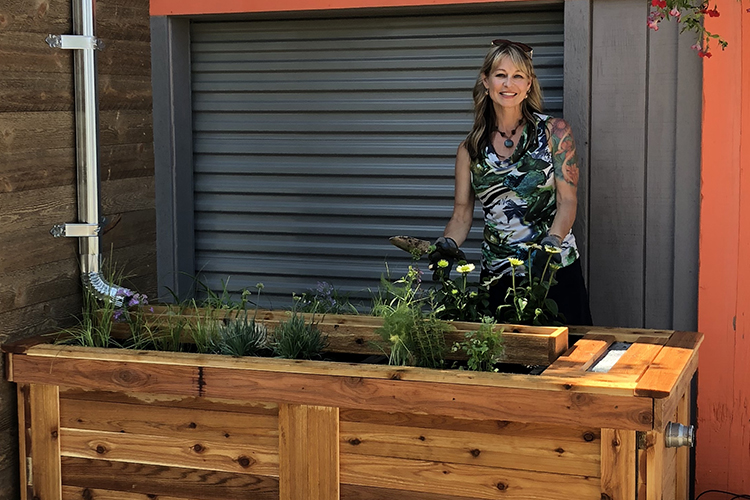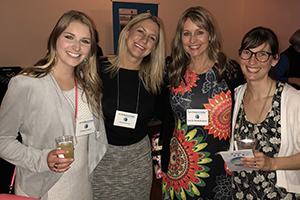
Carrie Bristoll-Groll shows off StormGUARDen, a product her company launched that serves as a combination rain garden and rain barrel. (Photo courtesy of Carrie Bristoll-Groll)
Wisconsin is blessed with an abundance of water. We have so much water, we often end up with too much in the wrong places at the wrong time. This water picks up undesirable elements and flows over a multitude of contaminated surfaces.
A UWM alumna and local engineering guru noticed the lack of proper stormwater management in the Milwaukee area, and has built a successful business to fill this void. She now helps municipalities, businesses and even homeowners manage the water that flows so abundantly across the region.
Carrie Bristoll-Groll, who earned her bachelor’s degree in civil engineering from the College of Engineering & Applied Science in 1994, is the principal civil engineer and CEO of Stormwater Solutions Engineering. She founded the firm in 2002 to specialize in the treatment, storage and safe passage of stormwater.
Before starting her own business, she worked for the cities of Milwaukee and Brookfield as a stormwater civil engineer.
“Working for these cities gave me a solid background in understanding the issues cities, builders and developers face,” she said. “In the 1990’s, government stormwater regulations really started taking off, so having the experience in a field that was trending gave me an edge. I had a niche business that focused specifically on those stormwater management issues, and I was determined to implement stormwater solutions with the health of our local environment in mind.”
Growing business
Bristoll-Groll’s business, Stormwater Solutions Engineering, designs sustainable stormwater plans that imitate natural water management processes to reduce flooding and improve water quality. The business has grown slowly but steadily since 2002, and now employs 10 people – most of them women and many of them UWM grads.

Unusual in the male-dominated field of engineering, most of the employees at Stormwater Solutions Engineering have been women, including Cassandra Hoppe (from left), Alyssa B. Schmitt, Carrie Bristoll-Groll and Adrienne Cizek. All but Cizek are UWM grads. (Photo courtesy of Carrie Bristoll-Groll)
Stormwater Solutions recently took a step into the residential market with StormGUARDen, a product patented in April. Bristoll-Groll describes it as a combination rain garden and rain barrel that helps grow plants, prevent runoff and protect waterways from stormwater pollution. It’s been installed at homes, libraries and on many other local buildings, though marketing efforts have only recently begun.
Bristoll-Groll said she has faced many challenges as a woman in a traditionally male-oriented field. Even while earning her degree at UWM, she didn’t always feel she was the traditional Engineering & Applied Science student. She had started at a nontraditional-age and was a mother to two young children, 6 months and 2 years old.
“I knew it would be a challenge because I hadn’t been in school for a few years,” Bristoll-Groll said. “So, I started with one class one semester, then two classes the next, and three after that, and worked my way up to becoming a full-time student.”
Support helps
Her husband, Tony, was very supportive. “He’d take care of the kids when I had to study or had an exam.” In her junior year, she had a third child. “It got even crazier being pregnant in the middle of the semester and having a baby at the end of the semester. But it worked. I think when you are young, you can make anything work.”
While she faced some comments from colleagues early in her career who told her she should be home taking care of her children, she saw that attitude change as an older generation retired and the field became more diverse.
“We don’t see it at all in our office because we’re predominantly women working together. We’re also more mindful of what it takes to be a professional woman running a household.”
Working from home when a child is sick or leaving early for a soccer game is common, she said. “We’ve always been pretty flexible. It’s all about give and take. Happy employees stick around longer.”
Giving back
She is active in the community, the university and her profession. She is a founding member of Women of Water, a group of over 100 women in water-related industries who network and perform community service projects. She has also been a technical mentor for Engineers Without Borders and promotes career-related volunteer activity with her staff. One of her engineers, UWM alum Cassandra Hoppe, helps the UWM Engineers Without Borders team. Cassandra first met Bristoll-Groll during a senior design class at UWM and later joined Stormwater Solutions Engineering.
Stormwater Solutions Engineering has won a number of awards for its environmentally friendly designs. In 2021, the International Parking and Mobility Institute gave the company an excellence award for a surface parking lot at 10th and Historic Mitchell streets, and Storm Water Solutions magazine honored the firm’s work in improving schoolyards at five Milwaukee Public Schools in 2020.
In addition, Stormwater Solutions Engineering won a governor’s small-business award in 2018 and an innovation award from BizTimes for StormGUARDen.
Attracting young engineers
The focus on environment and sustainability is attracting young engineers for careers and internships, Bristoll-Groll said. She rarely has to advertise when she has openings at the firm.
“Our field is exciting. We’re doing things that are environmentally innovative and very cool. We get to go out in the community and talk with people about green infrastructure, water quality, rain gardens and rain barrels. There’s a real social side to the work. It’s not just sitting behind a desk and designing like a stereotypical engineer, though I’m not sure there is a stereotypical engineer anymore.”
